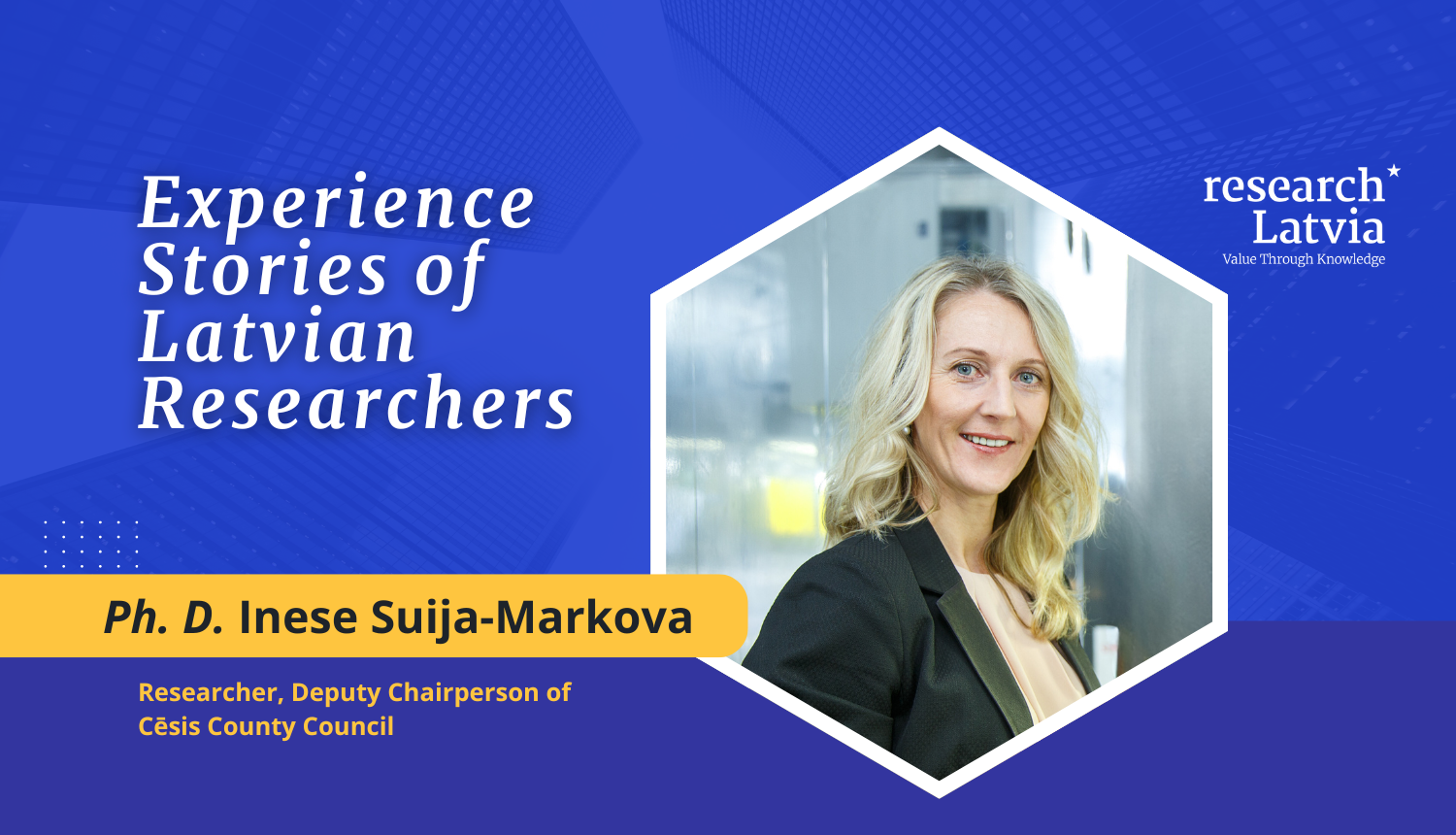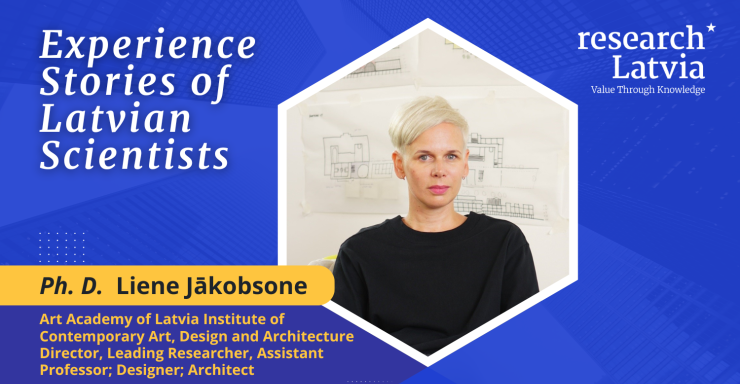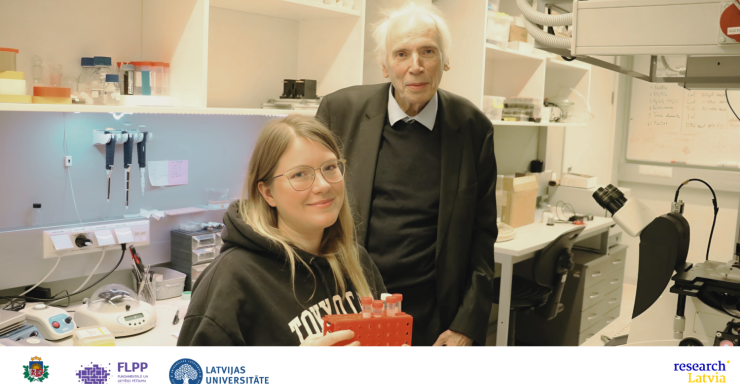Inese Suija-Markova is the Deputy Chairperson of the Cēsis County Council, focusing on development, environment, and climate neutrality issues. Alongside her role as Vice-Mayor of Cēsis, she also represents the municipality in the Vidzeme Regional Planning Development Council, where she serves as Deputy Chairperson. Together with other council members, she contributes to decisions on regional development, unified approaches, policies, fund allocation among municipalities, and addressing challenges and opportunities.
How did you get into politics?
My career in politics is a natural progression from what I have done before. During my school years, I was very active in various school community processes. While studying at Vidzeme University of Applied Sciences, I started working early as a project manager at the Cēsis Non-Governmental Organization Center and taught English to children and adults. Back then, Vidzeme University allowed students to combine study programs—spending two years in one study direction and two years in another. I combined political science with communication and public relations.
Given the size of Cēsis at the time, my local community involvement, responsiveness, and recognition, I was approached by leaders of local political parties. I entered local politics at a very young age. I believe I have been elected multiple times because of these factors. For the first time in my career, I am focused solely on politics, and for the past three years, I have been a full-time politician in the Cēsis County Council.
A Passion for Event Moderation
It is a natural talent and skills developed over the years. During school, I created and hosted events, regularly participated in public speaking contests, and sang. I have worked with various groups in society and have led interdisciplinary and cross-sector projects for many years. My strengths are the ability to learn and communication skills. I function quite well under stress and can solve problem situations. I practice event moderation a few times a year. In recent years, these have been large and prominent events, such as the major conferences of the Bank of Latvia, the Deep Tech Atelier organized by LIAA, TEDx Riga Technical University, and occasionally, I moderate events outside of Latvia. I enjoy doing this because it allows me to continue developing. First, I learn about the topic of the event I am moderating. Second, I meet new people, and third, I keep myself in shape by maintaining my moderation skills. Just like anything else in life, skills develop when you practice them. Event moderation is a passion of mine, and my colleagues approve of it.
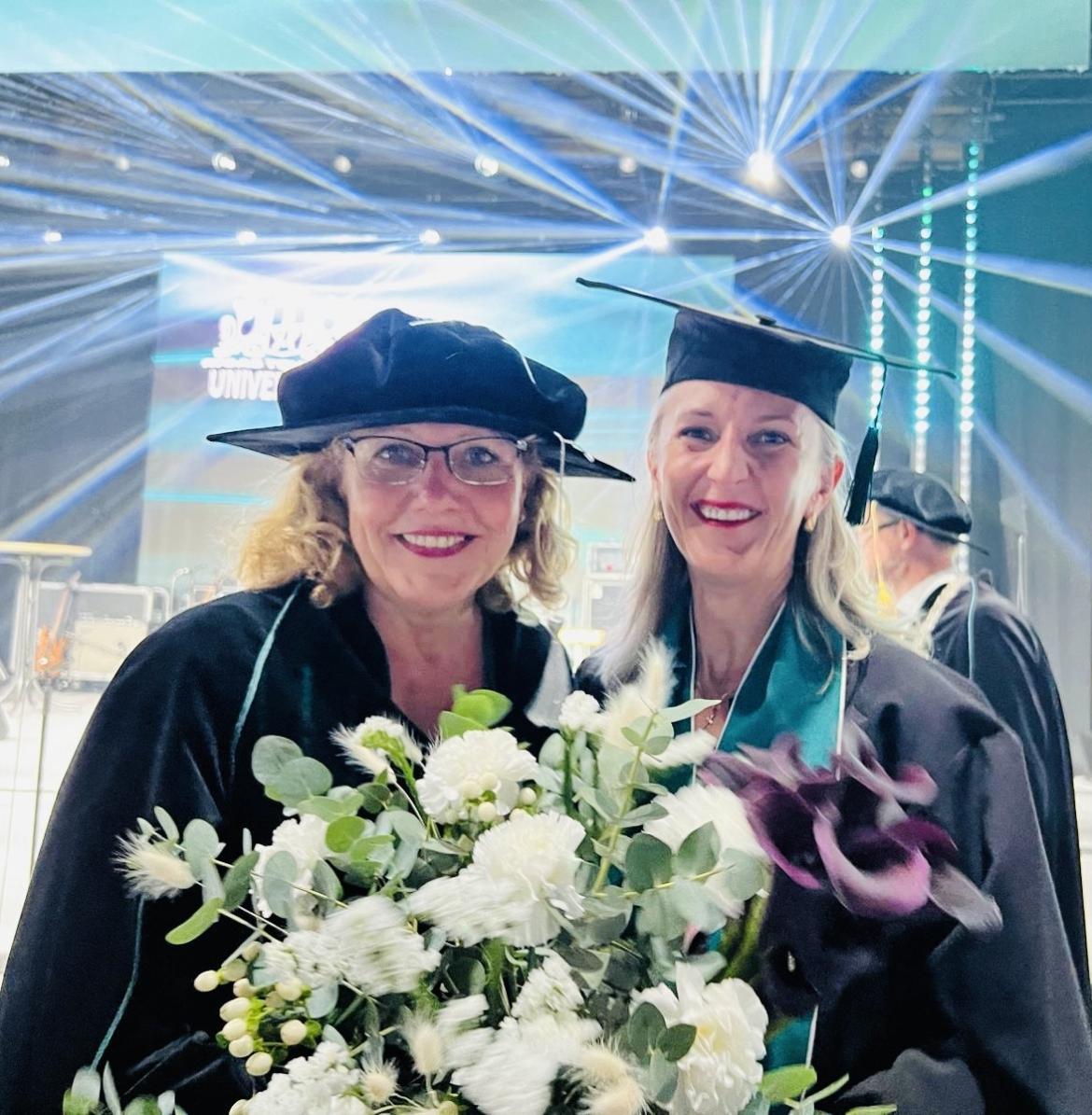
How Did You Get into Science?
Actually, two aspects motivated me to turn to science. The first is that, alongside my professional work, I spent many years teaching at Vidzeme University of Applied Sciences and Riga Technical University. I lectured on project management and innovation. The second aspect is that after completing my MBA, I moved into the private sector. In my master's program, I studied in the MBA program "Innovation and Entrepreneurship" at Riga Technical University's (RTU) Faculty of Engineering Economics and Management. It was a collaboration program between Buskerud University College in Norway and RTU. I started studying in 2004, which was the second year that this program was offered. To be honest, it was a very new topic at the time since innovation wasn’t yet as widely discussed as it is now. We had a very professional team of lecturers, most of whom came from the industry, particularly the technology sector.
In the private sector, I was initially invited to work as the development director in a forestry company. Together with the company owner, when discussing the future development path for the company, we came up with the idea of creating our own interdisciplinary research and innovation institute. The Institute for Environmental Solutions was also an innovation at the time. There were not many private research institutes in Latvia. Companies had research and development departments, but we were creating a separate, internationally-oriented organization. I worked with a very highly qualified team, mainly consisting of scientists or researchers (even if they did not have a scientific qualification, they were still engaged in research). As a leader, I felt that something was missing from my skill set. I didn’t fully understand the professional mentality of scientists and wanted to gain a deeper understanding of what a scientist’s work means, what it means to write a scientific publication, and what it means to conduct research aiming for results, not just being involved in the research process. My curiosity drove me. That’s how I ended up at my previous RTU faculty and enrolled in the doctoral program.
How would you describe a scientist in Latvia and around the world?
I believe that being a scientist as a profession is not different, because the main goal of a scientist is to study and understand the world, create new knowledge, or find solutions to practical problems. In practice, I have noticed differences between scientists who have worked only in state-funded research institutes and have had limited contact with contract research, and those who have been involved in research and development in commercial enterprises or have developed their own businesses. These are two different mentalities. Scientists who have worked or continue to work in real industry are expected to have a special discipline, efficiency, and the ability to adapt scientific methods to business and technological goals. The industrial environment puts pressure on scientists, so you can see a completely different pace and methods in their work. The industrial environment demands quick adaptation to changing requirements and market conditions. If one approach does not yield results, they must be ready to quickly switch to an alternative solution. For these scientists, factors like publications, conference presentations, or competing for public research funding are secondary.
On the other hand, where there is no pressure from business or research sponsors, there is a different kind of thinking. There, scientists want to do more research, and the process is longer because there is not as much pressure directly on the results. I am not talking about fundamental science, which is an essential process in itself and must exist, because through it we discover new phenomena, patterns, and principles that will only be applied practically after many years. I am talking more about applied or practical science. Since I had the opportunity to work at the Institute for Environmental Solutions with Latvian and foreign scientists, this difference in thinking could be seen particularly in those scientists who have been linked to industry for decades.
In Latvia, there are still few companies with research and development departments.
Currently, we still have few companies where systematic research and development take place internally. There are in-house scientists in the pharmaceutical, technology, and maybe some food companies. However, the main approach is to create collaborations— with universities, scientific institutes, individual scientists, or knowledge-intensive companies.
What could be changed or improved in Latvia to provide commercialization opportunities for our young and existing scientists?
In my opinion, for a scientist to truly understand what it means to be involved in industrial research and development, they should already be in the industry during their studies. In this regard, the new industrial doctoral programs are very important, as during the development of their dissertation, the future scientist already knows that they are researching the needs of the industry. This could be one path. Also, equally important are various state support programs for the commercialization of scientific developments and the development of knowledge-intensive businesses, such as business incubators, accelerators, innovation clusters, and grant programs. We must not forget that scientific research is also needed in other sectors, including public administration. Public administration serves the interests of society, and its activities are focused on developing policies, services, and infrastructure that meet the needs of society. Scientific research plays a crucial role in this context, ensuring that decisions are made based on evidence and data, rather than just political or emotional considerations. In any case, it would be beneficial if, during their doctoral studies, future scientists had connections with end-users of research.
Industry in Latvia is not as developed
We have a lot of small and micro enterprises. Clearly, our industry is not as developed as in the economies of larger countries. The ability to think about innovation and seek collaboration with scientists is found in businesses that are growing and have accumulated some critical mass of knowledge and finances. Therefore, the need for public sector intervention in the development of innovative entrepreneurship remains cold. For example, within the Vidzeme Planning Region, together with the Vidzeme University of Applied Sciences, we have established the Vidzeme Open Innovation Center, which has a jointly funded employee. The team there is developing new methods to engage our companies where they might not otherwise be involved. For example, innovation hackathons and innovation co-creation labs. In fact, the regional innovation center serves as a platform that brings together various players, showing them new opportunities. If the industry itself does not demand it, you can help guide and provide the opportunity to start thinking about the company’s needs at the next level.
What do you think are the main challenges for science and researchers?
In my opinion, scientific research funding in Latvia has traditionally been insufficient compared to many other European Union countries. This limits the ability to conduct high-quality and long-term research. The salaries for scientists and researchers in Latvia are significantly lower than the European average, making the profession less attractive to young talent. Low salaries contribute to "brain drain," and many talented scientists choose to work abroad, where science is better funded and supported.
Our challenge is to retain and bring back our well-educated scientists from abroad to Latvia. It is clear that the battle for brains is happening everywhere. Our people are smart. They are creative. They are well-educated. They most often stay where there are opportunities. And opportunities are where there is a critical mass of resources. Usually, these are in highly developed countries. This remains a significant challenge for us. I believe we need to allocate more resources both within universities and scientific institutions to attract researchers of this caliber.
Another challenge is related to what we discussed earlier. In Latvia, a scientific career is often unstable and offers limited opportunities for professional growth. We have an underdeveloped industry that could demand scientific research. At the same time, I am very pleased that in recent years, precisely due to initiatives from universities and individual companies, interdisciplinary and cross-sectoral programs have started to emerge to tackle complex problems and promote innovation, such as the microchip development initiative and the creation of the Artificial Intelligence Excellence Center. We are integrated into international organizations like the European Space Agency and CERN. I believe that all this will eventually, sooner or later (preferably sooner), lead to the development of an industry in Latvia that will recognize the importance of scientific research in solving complex problems and fostering innovation.
Finally, from the perspective of state-funded scientific institutions, we still remain highly dependent on European Union funding programs and cycles. The biggest challenge in this process is that scientists "drown" in administrative tasks – writing project proposals, organizing procurement, preparing various types of reports, which significantly reduces the time they could dedicate to actual research. Here, a lot depends on how successfully organizational leaders can create processes and attract resources that would free scientists from these administrative tasks, and, to be honest, sometimes seemingly pointless tasks.
What are your predictions for the future development of science in Latvia and globally?
I believe that globally, the role of science will not diminish in any way. Science has always existed. We face very large challenges that require new models of thinking, new methods, approaches, and technologies. This is related to global challenges such as climate change, biodiversity loss, public health, and safety issues. Also, the huge technological progress we are experiencing. It is very transformative, and we still don't quite grasp what, for example, the development of artificial intelligence brings with it. I believe the role of science will only become more significant.
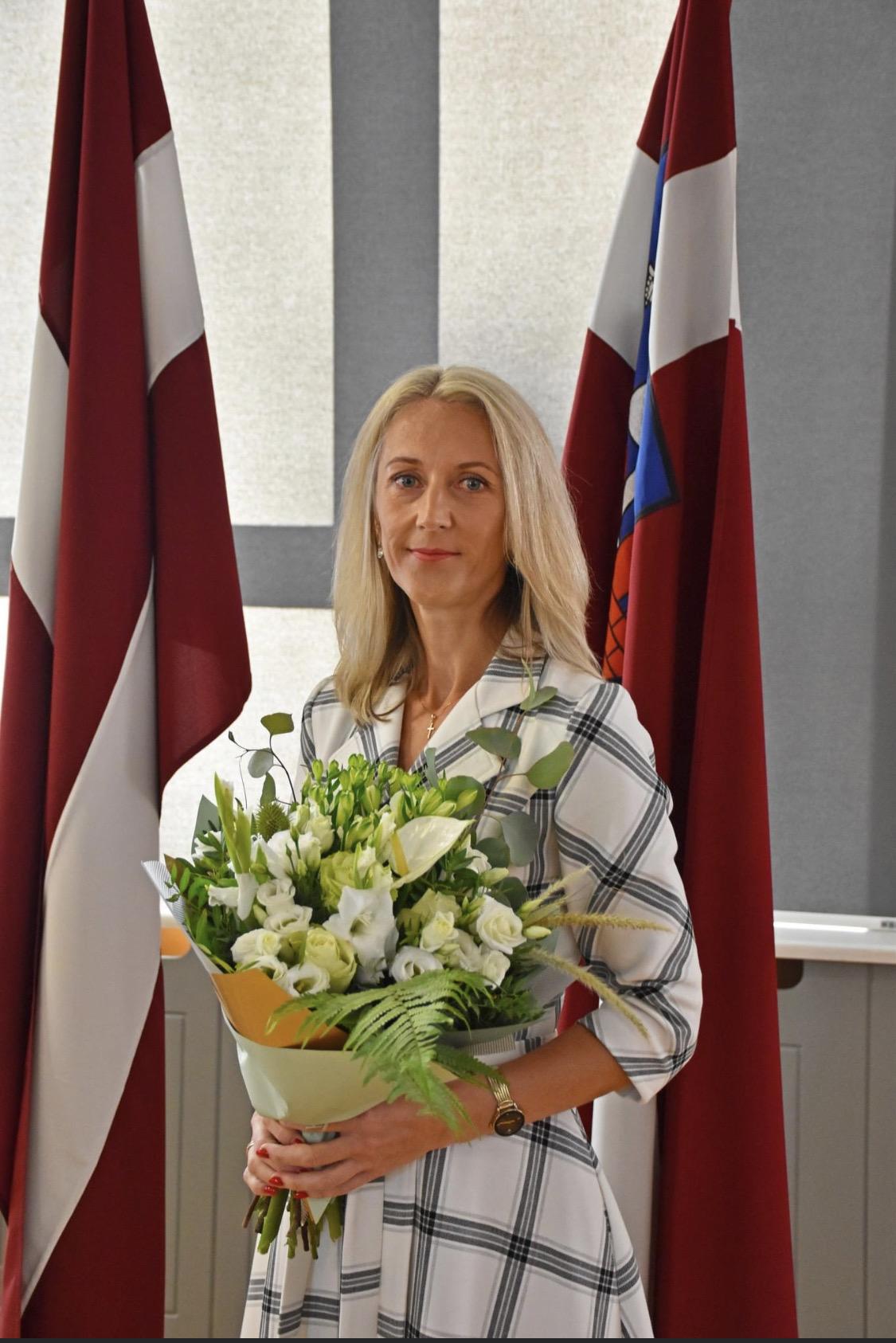
Every change brings opportunities
The question is about the future of Latvia. I believe we, as a country, are on the verge of significant transformative processes. It is clear that what we are experiencing now, for example, how difficult it is to form the national budget and allocate resources, requires major structural changes. We can make cosmetic fixes, but in the long term, that won't help. I can say this as a politician working at the local and regional level. Incremental changes are not enough here. On the other hand, fundamental changes are very difficult. The system can no longer sustain itself; it is inefficient. It must collapse and, to some extent, be rebuilt, which opens up a vast field of opportunities for science. It is a matter of courage to determine our priorities and where we need to direct resources. This isn't going to be easy for us. I think these will not be simple times. To be honest, even within science, transformations need to happen. Transformation in the system is needed throughout, which means we will have to consolidate and tighten our belts. This tightening will be associated with resource redistribution. I don't have the perfect solution, but I try to keep my mind open and live with the thought that every change brings opportunities.
In conclusion, what are your words of advice for aspiring and young scientists?
I was asked this question when I defended my doctoral dissertation after seven years in the process. Specifically, my doctoral journey lasted seven years, which is probably too long and too much. I’m glad that now PhD students have the opportunity to be full-time in their doctoral studies instead of doing it alongside a full-time job. My advice is to enjoy the journey, no matter how bumpy and emotionally challenging it may be, not to give up, and to go all the way. If I am asked if I would do it again, I would definitely do it again. A PhD gives you skills and changes the way you think.
I would also recommend professionals to pursue a PhD, because, you see, career paths do not always lead to science. People with a PhD and that way of thinking are needed in all sectors. The key is to be open, focus as much as possible on collaboration, and strive to be better each day than the day before. Then we will not be afraid of competition. Where your thoughts are, there is your energy. Follow your path and think about what you can do better. You need to change, and then the world around you will change.
---
About the Series of Articles “Experience Stories of Latvian Scientists”
This article series, created by the communication platform of the Ministry of Education and Science “researchLatvia,” provides insights into the work of Latvian researchers, promoting a deeper understanding of the role of science in society and fostering dialogue between scientists and the broader community.
These stories invite both current and future researchers and the society to explore the achievements of Latvian science and draw inspiration and motivation from the experiences of individuals who have dedicated their careers to scientific endeavors. The interviews are conducted as part of Project No. 1.1.1.1/1/24/I/001 “More Efficient and Smarter Implementation and Management of Latvian Science Policy.”
